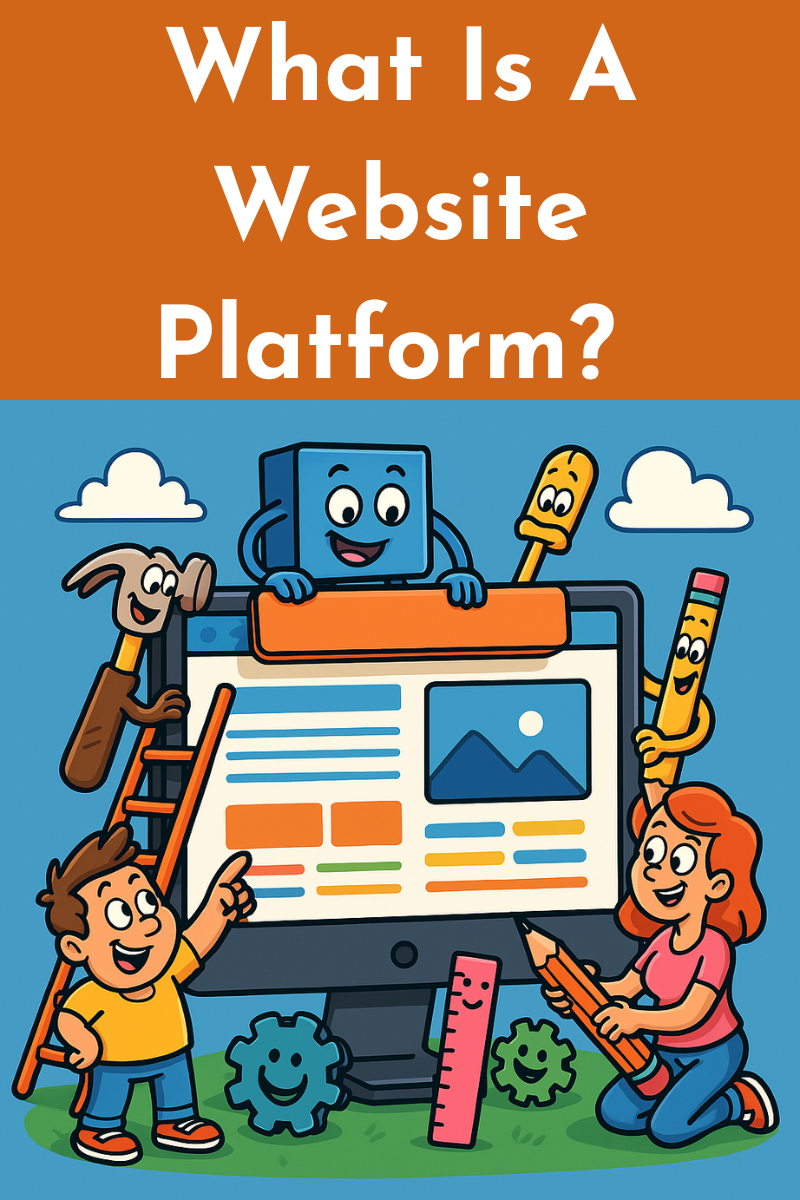A website platform is your launchpad into the digital world, even if you’re not the tech-savvy type. If you’re asking your “what is a website platform?”, it’s basically your toolkit for creating, designing, and managing a website without mastering a single line of code! Think of it as the backbone that supports all your creative ideas, offering everything from design templates to hosting services.
So, What Is A Platform Platform?
Let’s get to the core of it.
Major players in the world of website platforms include WordPress, Wix, and Squarespace.
These are big names for a reason—they make the complex simple.
WordPress is the powerhouse for flexibility, while Wix and Squarespace are champions of simplicity. Each has its charm, so understanding what you need from your website is key.
Get Online Step By Step uses the WordPress platform. I use a premium theme called Divi from Elegant Themes.

When deciding what is a website platform that works best for your needs, it’s helpful to look at what kind of website you’re hoping to create, how much control you want, and how comfortable you feel with tech.
Do you want sheer power and flexibility? WordPress might just be your best bet. New to the game and want something straightforward? You can’t really go wrong with Wix or Squarespace, famous for their user-friendly interfaces and ready-to-go design templates.
In essence, the importance of selecting the right platform can’t be overstated. This decision shapes every step you’ll take in building your digital presence. A perfect match can make the process enjoyable and your online identity pop!
Is Owning a Website Free? An Honest Look
You might be wondering if you can get your website up and running without spending a dime. While it sounds tempting, owning a website isn’t entirely free, but there are options to start with a smaller budget. Free platforms like WordPress.com and Wix let you dip your toes in the water with limited features, often showing ads on your site. Once you’re ready to expand and kick those ads out, upgrading to a paid plan becomes essential.
Let’s break it down. You’ll usually need to cover essentials like a domain name, costing around $10 to $15 each year. This is your unique web address, kind of like your home address but online. Then, there’s hosting, which is like renting a plot of land to build your website. Basic plans might be free on some platforms, but better performance could set you back $3 to $25 monthly.
Don’t forget platform fees if you’re using website builders. These range from $10 to $40 or more every month. WordPress.org is free to use technically, but you’ll need to account for hosting and domain registration costs separately. Keep all this in mind when budgeting for your site’s future. Starting with free options can be a good experiment, but planning for eventual expenses will keep you prepared. With Wealthy Affiliate’s free membership you can own a free website which costs nothing and gives you the benefit of trying things out without the risk. If you’d like to have a look at Starter Membership at Wealthy Affiliate, click here
Choosing the Right Website Platform for Your Needs
When deciding what website platform to go for, it’s all about what you need from your website journey.
It’s like finding the perfect pair of shoes—fit is everything! For those craving ease of use, Wix and Squarespace are standout choices. Their drag-and-drop interfaces make designing your website as simple as pie, letting you focus more on content and style than technical hoops.
If you’re all about customization and want to dive deeper into what a website can offer, WordPress is your playground. This platform gives you freedom and power, but with great power comes a bit of a learning curve. While WordPress.org itself doesn’t ask for fees, you’ll need a hosting service and a domain name before your site can go live.
For those with e-commerce dreams, Shopify is tailored to online stores, offering built-in tools and an easy-to-manage experience for selling products. It handles inventory, payments, and shipping seamlessly, making it an attractive option for tapping into the online shopping world.
In choosing your platform, consider what’s most important for your project: simplicity, flexibility, or e-commerce capabilities. Each platform shines in its own way, making it about finding that one that aligns with your current and potential future needs. Take your time and explore trial periods or free plans when possible—you’ll get a real feel for what each can do for you.
Estimating the Cost of Building Your Website

Figuring out how much to spend on a website can feel like a confusing maze of numbers and options. Truth is, costs can vary wildly based on what you’re aiming for. Let’s clear the fog a bit by breaking it down based on different goals you might have.
For a personal or small business website, you’re looking at around $200 to $300 a year. This usually includes the cost of your domain and hosting. If you’re opting for a little more with additional features like more storage or premium templates, plan for a bit extra.
When setting up an e-commerce site, that budget bumps up. Platforms like Shopify start around $39 monthly, ready with tools to sell and manage goods online. On the other hand, if you’re leaning towards WordPress with WooCommerce, it might initially look cheaper, but remember that costs add up with required plugins and extra setup work.
If you’re dreaming big with a custom-designed website, prepare your wallet for a bigger hit—anywhere from $2,000 upwards depending on what you need and if you’ll hire professionals. This option gives you exactly what you want but involves more upfront planning and investment.
Knowing these costs upfront lets you plan better, ensuring you’re aligning your effort and spending with your goals. Start with what feels right and expand as you grow—this web journey should fit both your vision and budget.
For those of you interested in exploring platforms, here’s a great beginner comparison guide from Website Builder Expert.
If you’re working on a really tight budget, it’s worth keeping an eye out for deals on domain names and hosting—especially around Black Friday or seasonal sales. Some platforms also offer bundle deals for the first year that can save you a good chunk upfront.
And Finally...
Creating a website is a bit like crafting a custom-fit suit; it’s an investment in your future that can evolve with you. Picking the right platform, understanding costs, and deciding what features matter most are all part of the experience. The beauty here is that the digital landscape is flexible, letting you start small with free or basic plans and scale up as your needs and budget grow.
If you’re beginning, exploring platforms like Wix or WordPress for their mix of ease and flexibility can set a solid foundation. Many people find starting modestly with these options allows them the room to learn without pressure. Once you find your rhythm and see where your site needs to go, upgrading becomes more of a strategic step rather than a necessity.
Think about your website like growing a garden; it needs care, sometimes investment, but ultimately, it should be something that reflects you and your ambitions. Stay tuned to the changes in your needs and those of your audience, and adjust your platform and features to find the right balance.
Whether it’s a personal blog, a professional site, or a bustling online store, the key takeaway is to choose a path that complements your unique objectives. As your journey unfolds, keep adapting and evolving your online presence, making sure it always resonates with who you are and what you’re about.
If you’ve been wondering what is a website platform or how to choose the right one, I hope this guide has made things feel a bit less overwhelming. Starting a website can feel like stepping into a whole new world, but you’re not alone. It’s all about finding the right platform that works with your budget, your goals, and how hands-on you want to be.
Have you already picked a platform? Maybe you’re still weighing up the options? I’d love to know where you’re at. Drop a comment below and share your thoughts—whether you’re stuck, excited, or somewhere in between. Your insight might just give someone else the nudge they need to get started too.
Have you picked a website platform yet, or are you still weighing up your options?
Maybe you’ve already tried one and have a few thoughts to share? I’d genuinely love to hear where you’re at.
Drop your questions, experiences, or even a bit of friendly advice in the comments below—your input could really help someone else who’s just starting out on their website journey.
Here’s a little transparency: My website contains affiliate links. This means if you click and make a purchase, I may receive a small commission. Don’t worry, there’s no extra cost to you. It’s a simple way you can support my mission to bring you quality content.”

